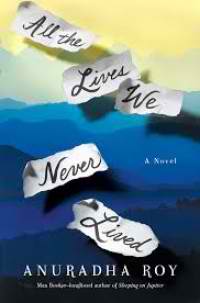All the Lives We Never Lived by Anuradha Roy
 Monday, November 26, 2018 at 6:35AM
Monday, November 26, 2018 at 6:35AM 
First published in Great Britain in 2018; published by Atria Books on November 20, 2018
Abhay Chan, known to most as Myshkin Rozario, finds trees and dogs to be better companions than humans. He is an old man who faces ridicule, yet the reader comes to understand him as eccentric in the best way, shaped by good intentions and disappointment with the human condition. Like everyone, has been shaped by his past. Unlike most, the details of his past have been concealed from him. Only later in life does he appreciate his need to fill in the missing pages.
Myshkin tells the story of his youth, but it is really the story of his mother, Gayatri, who (unlike most Indian women of her time) was raised not to catch a husband but to nurture her gifts for art and music. Gayatri’s father traveled abroad with her until, after his death, her brothers began the task of finding her a husband who was willing to tolerate a sharp-tongued woman who had wasted her youth by crossing oceans. Finding Gayatri a husband meant exhibiting her as livestock while suitors and their families drank tea in the drawing room and inspected her hair. The family’s choice boiled down to the only man who would have her, a Northern Indian twice her age whose scandalous contempt for caste and religion did not overcome the family’s desire to rid themselves of Gayatri.
It is in chapters like those narrating Gayatri’s arranged marriage that Anuradha Roy captures the India so familiar to readers of UK fiction and that so often wins (or is shortlisted for) Booker prizes. It is an India that awards only such freedom to women as self-congratulatory men choose to give them, that refuses to abandon a caste system even as it rebels from British colonizers with grand speeches about the importance of equality and self-determination.
Myshkin recalls a German writer/artist/musician named Walter Spies who appeared in search of Gayatri, having met her years earlier in Bali. Spies is accompanied by Beryl de Zoete, a scholar of dance who once rescued Jewish dancers from Germany and now sees Gayatri as worthy of rescue. Gayatri has felt stifled since Myshkin’s birth, as if the beginning of his life put a stop to the rest of the world, and it is knowledge of that fact that shapes Myshkin’s memories of his childhood.
Indian history is central to the novel in other respects, as well. While mostly hiding in the shadows, Myshkin’s father claims to follow the spiritual leader Mukti Devi in her nonviolent resistance to British rule. Myshkin’s father views Mukti Devi as an exemplar of women’s liberation. Gayatri can only wonder why his enlightened view of women’s role in society does not extend to his own home. Later, Myshkin can only wonder about the fated moment when his mother leaves home without him. From her perspective, Gayatri had no choice: obedience and propriety were the top entries on her personal list of deadly sins.
The novel’s first half sets up Myshkin’s life as a child abandoned by his mother. The story then moves through his father’s efforts to cope with his loss of Gayatri, the impact of World War II on India and on Myshkin’s father, the evil nature of governments that define protest as sedition or homosexuality as a crime, the different attitudes toward women in Indian and Balinese society, and Myshkin’s evolving understanding of his mother. The novel invites a sympathetic response both to Myshkin (who yearns for a lost mother) and Gayatri (who abandons a child to avoid going mad but must live with the maddening consequences of that decision).
A couple of lengthy sections comprised of Gayatri’s letters home create a lull that is the novel’s only misstep. The letters illustrate Gayatri’s growth and they add new insight into Gayatri’s decision to leave her husband, but Gayatri’s anxiety-filled travelogue lacks the immediacy of the narrative that precedes and follows the letters.
One letter accuses someone in Gayatri’s past of “feckless self-indulgence,” a criticism that might seem hypocritical given the choices that Gayatri made. The novel’s value is that it invites the reader to weigh Gayatri’s choice and to consider whether, on balance, it was the right choice to make. I appreciate Roy’s decision to allow the reader to judge Gayatri, or not, rather than insisting that only one judgment is possible.
In any event, judgment is not the point of All The Lives We Never Lived. As the title suggests, all lives involve choices. Each choice sends us on a path that forecloses other paths. With graceful prose and compelling characters, Roy reminds us how the same choices can be both liberating and confining as they lead to unknowable futures and cause unforeseeable consequences.
RECOMMENDED
Reader Comments